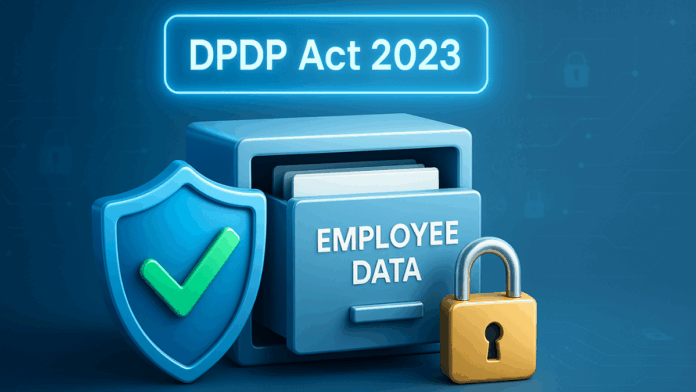India’s Digital Personal Data Protection Act, 2023 (DPDP Act), is a new law that protects people’s personal information. It covers things like names, addresses, and even sensitive details like health records or bank account numbers.
What Is the DPDP Law and Why Does It Matter?
For employers, this law is a big deal because it changes how companies handle employee data. Whether it’s job applications, payroll details, or medical records, HR teams must follow strict rules to keep this information safe.
The DPDP Act replaces older laws like the Information Technology Act, 2000, which had fewer rules about protecting employee data. Unlike the older laws, the DPDP Act applies to all digital personal data, not just sensitive information. This means HR teams need to rethink how they collect, store, and use employee details. If they don’t follow the law, companies could face hefty fines or legal trouble.
This law is also important because employees now have more rights over their data. They can ask to see what information their employer has, correct mistakes, or even demand that their data be deleted. These rights make it crucial for HR teams to stay on top of data protection rules.
Labour laws under pressure as cross-border freelancers face misclassification and neglect
How Does the DPDP Law Connect to Labour Laws?
Labour laws in India, like the Industrial Disputes Act or the Shops and Establishments Act, set rules for how employers treat workers. These laws cover things like wages, working hours, and employee rights. The DPDP Act adds a new layer by focusing on employee data privacy. For example, labour laws might require employers to keep records of employee attendance or salaries. The DPDP Act says these records must be protected and only used for specific purposes.
HR teams often collect personal data during hiring, like resumes or background checks. Labour laws allow this to ensure fair hiring practices, but the DPDP Act requires getting employee consent before collecting or sharing this data. If an employer shares employee details with a third party, like a payroll company, they must ensure the third party follows the same strict data protection rules.
The DPDP Act also affects how employers monitor workers. For instance, some companies use cameras or software to track employee performance. Labour laws might allow this for workplace safety, but the DPDP Act says employers can only collect data necessary for the job. This means HR teams must balance workplace rules with employee privacy rights.
???? M&A Deals Destroyed by Hidden Labour Law Traps—What No One Tells You!
What Are the Key Rules for Employers Under the DPDP Act?
The DPDP Act has clear rules for employers handling employee data. First, employers must tell employees why they’re collecting their data and how it will be used. For example, if HR needs an employee’s bank details for salary payments, they must explain this clearly. Employees must give their consent, and they can withdraw it later if they want.
Second, employers can only keep data for as long as it’s needed. If a job applicant isn’t hired, their data should be deleted unless they agree to keep it for future opportunities. This rule, called data minimisation, prevents companies from holding onto unnecessary information.
Third, employers must keep employee data secure. This means using strong passwords, encryption, or secure storage systems to prevent data leaks. If there’s a data breach, employers must quickly inform affected employees and take steps to fix the problem.
The Future of Data Protection in India: Key Insights from the Draft Rules
Finally, the DPDP Act allows employers to process data without consent for specific “employment purposes,” like preventing fraud or protecting company secrets. However, even in these cases, employers must be transparent and not overuse this exception.
Why HR Teams and Privacy Officers Should Care
The growing concern over privacy means employees expect their personal information to be handled with care. Mishandling data can lead to legal penalties, loss of employee trust, and damage to a company’s reputation. HR teams, privacy officers, and employment lawyers need to work together to create clear policies for data collection, storage, and sharing.
For example, HR teams should train staff on data protection rules and regularly check their systems for security risks. Privacy officers can help by conducting data audits to ensure compliance with the DPDP Act. Employment lawyers can review contracts to make sure they meet both labour law and data protection standards.
By aligning HR practices with the DPDP Act, companies show employees they value their privacy. This builds trust and helps create a workplace where everyone feels respected and protected.


